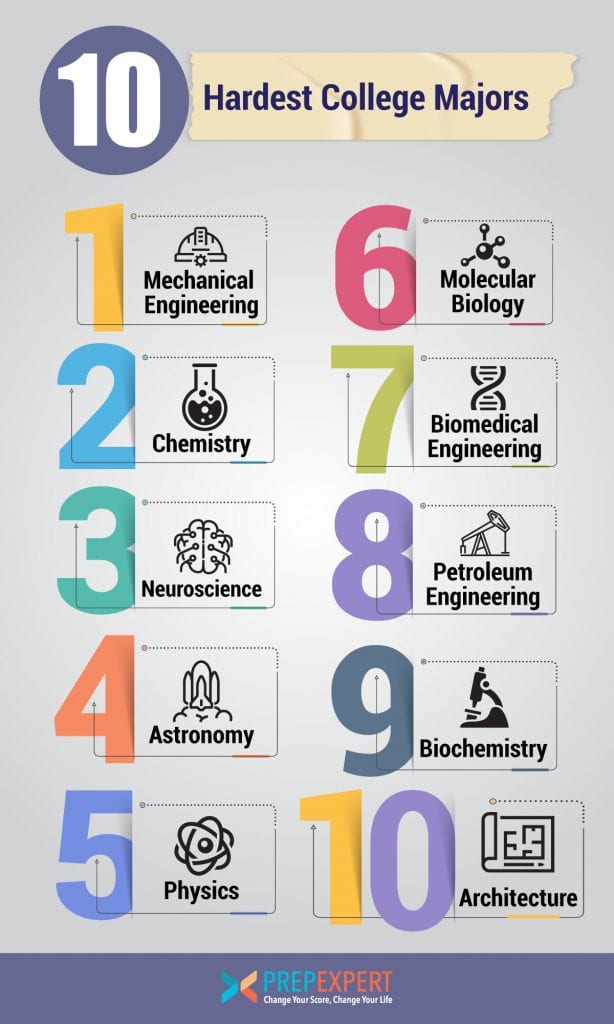10 Hardest College Majors
Not sure what to study yet in college? Is the list of potential majors overwhelming? Do you enjoy challenges? If that last answer is ‘yes’, then it won’t hurt to consider these hardest college majors we have listed below. Not only are they challenging, but they are also financially lucrative.
Are you looking for a challenge in college? If so, then these 10 hardest college majors will provide that and more.
On the flip side, here’s a quick rundown of the easiest college majors at most schools.
Mechanical Engineering
Don’t underestimate the work that goes into machines in motion.
Mechanical engineers devote themselves to analyzing, designing, and manufacturing anything in motion essentially. Course work includes classes in:
- Calculus
- Chemistry
- Design
- Dynamics and Controls
- Physics
- Thermal Sciences
Students often spend nearly 20 hours per week on average on classwork.
Chemistry
Chemistry majors spend a lot of time studying reactions.
Chemistry majors spend, at minimum, 18 hours per week on classwork alone. Imagine that.
It makes sense though as they’re concerned with learning the behavior, overall composition, and varying functions of matter.
They also have to learn all of the different reactions between different states of matter too. A typical Chemistry major class load includes:
- Biology
- Calculus
- General Chemistry
- Organic Chemistry
- Physics
- Statistics
There is a lot of lab work on top of that as well.
Neuroscience
Understanding how the brain and nervous system work is exhausting.
Again, expect to spend almost 20 hours per week on classwork for this major. This field of study is all about understanding the human nervous system in terms of structure, development, and functionality.
On top of all that, you have to study how the brain interacts with it too. Neuroscience majors can expect a course load including the following subjects:
- Biology,
- Chemistry
- Calculus
- Physics.
Don’t expect a cakewalk here.
Astronomy
Astronomy teaches you how celestial objects are created and interact with one another.
This major covers the gamut of celestial phenomena:
- Planets
- Stars
- Asteroids
- Galaxies
- Black Holes
- Supernovae
The classes you need to take include:
- Astrophysics
- Calculus
- Computer Science
- Cosmology
- Geology
- Physics
Expect to spend between 18 to 19 hours a week on classwork here.
Physics
Understand the fundamental forces that form and shape the universe.
Physics majors and astronomy majors have a lot in common, especially regarding class and homework time. Prepare to pencil in between 18 to 19 hours a week on this major.
During those hours, you’ll learn about the properties of matter as it moves through space and time. You will also learn the concepts behind energy and forces.
Common course topics within this major include:
- Electricity
- Magnetism
- Thermodynamics
- Quantum Physics
- Waves and Vibrations
- Gravity
Molecular Biology
This major combines many life sciences together.
Molecular biology is an interdisciplinary field, meaning it draws from various other majors. The subject itself is the study of cellular structures and processes as they related to life forms.
Common prerequisite courses include:
- Biology
- Biochemistry
- Chemistry
- Ecology
- Immunology
- Math
Biomedical Engineering
This interdisciplinary major combines engineering and biology for health care purposes.
Biomedical engineering is a specialty within bioengineering that seeks to apply engineering principles to biology theory.
Class-wise, biomedical majors complete, at minimum, the following courses:
- Calculus
- Chemistry
- Electric Circuits
- Engineering Design
- Physics
- Statistics
- Thermodynamics
Biomedical engineer students can expect to spend at least 19 hours per week in class.
Petroleum Engineering
Learn the theory and processes of how oil and natural gas are extracted and produced.
If you choose this major, expect to spend between 18 to 19 hours a week learning the intricacies of fossil fuels. Common classes include:
- Calculus
- Chemistry
- Energy and the Environment
- Geology
- Petrophysics
- Properties of Petroleum Fluids
- Reservoir Geomechanics
Expect a career in the energy industry after graduation.
Biochemistry
This major takes chemistry to the next level.
Biochemistry majors focus on the chemical processes and materials within living organisms. Students learn how biological processes are governed by various chemical interactions.
The major is known to be more difficult than regular chemistry. Class-wise, expect to spend 18 and a half hours per week studying subjects including:
- Cell Biology
- Computing
- Evolutionary Biology
- Genetics
- Neurobiology
- Physiology
Architecture
Architecture is one of the hardest college majors out there.
As crazy as it sounds, architecture students spend, on average, over 22 hours a week on their classes. It makes sense; architecture students study the history and theory behind building structures.
In addition to theory, you also learn how to actually design and build for the public. Prerequisite classes include:
- Art History
- Calculus
- Design Processes
- Design Theory
- History of Architecture
- Physics
- Urban Design
For more test strategy, college admissions, and scholarship application tips sign up for our FREE class happening right now!
